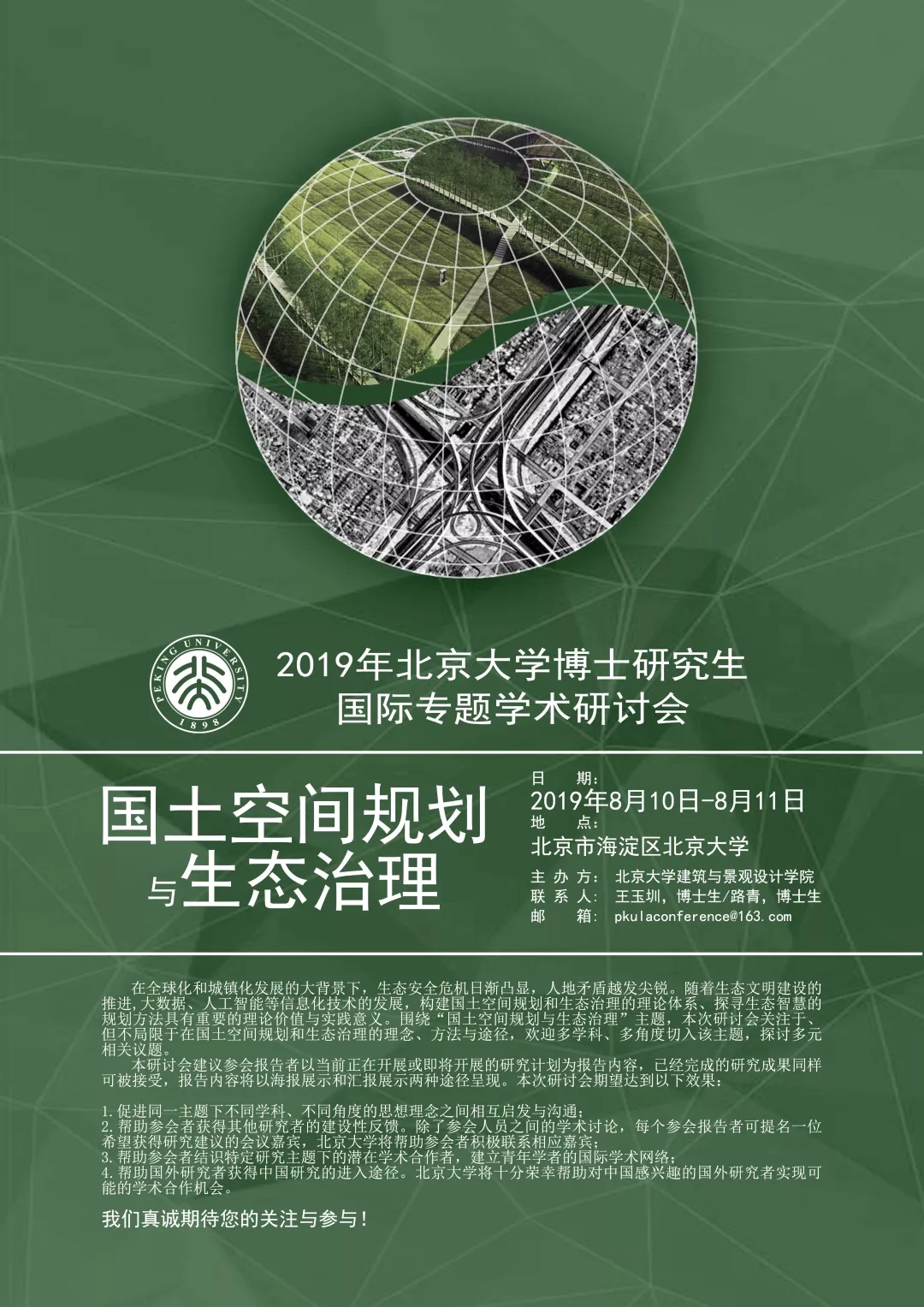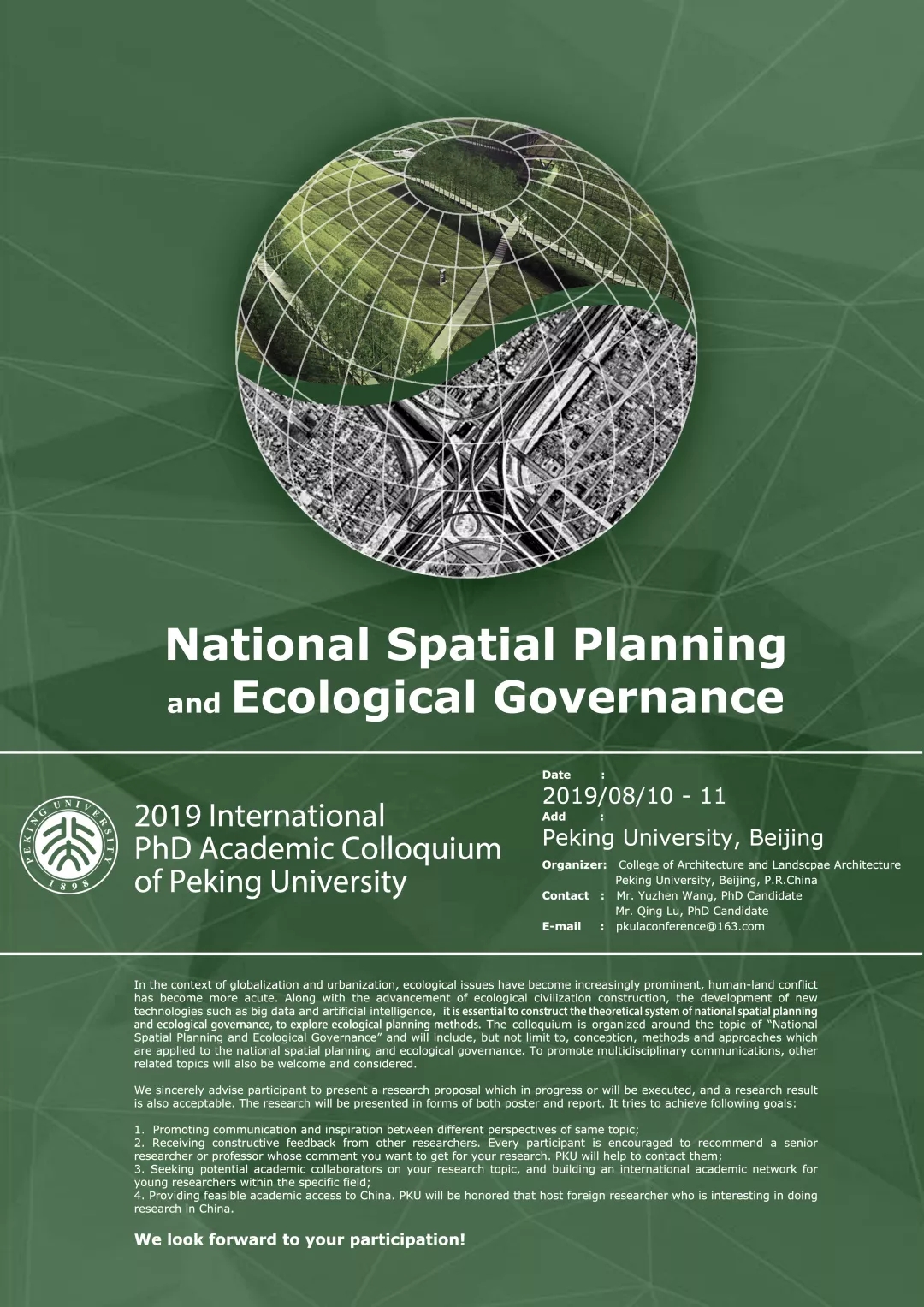地址:北京市海淀區(qū)中關(guān)村北大街100號(北樓)北京大學(xué)建筑與景觀設(shè)計學(xué)院一層 Email:info@landscape.cn
Copyright ? 2013-2022 景觀中國(www.36byz.com)版權(quán)所有 京ICP備05068035號
 京公海網(wǎng)安備 110108000058號
京公海網(wǎng)安備 110108000058號
北京大學(xué)博士研究生國際專題學(xué)術(shù)研討會
——國土空間規(guī)劃與生態(tài)治理
會議簡介:
“北京大學(xué)博士研究生國際專題學(xué)術(shù)研討會”是以國內(nèi)外優(yōu)秀的在校博士研究生為主要組織者舉辦的“國際專題學(xué)術(shù)研討會”,鼓勵博士研究生建立和發(fā)展更多的國際學(xué)術(shù)聯(lián)系,培養(yǎng)綜合素質(zhì),為未來的學(xué)術(shù)發(fā)展奠定基礎(chǔ),至今已經(jīng)成功舉辦9年。在互相學(xué)習(xí)基礎(chǔ)上,為青年學(xué)者正在進(jìn)行的研究提供一個開放性討論、獲取資深研究者評論和建設(shè)性建議的研討平臺。延續(xù)本研討會的一貫風(fēng)格,今年將對圍繞 “國土空間規(guī)劃與生態(tài)治理” 主題的博士生研究計劃展開學(xué)術(shù)討論、整合研究資源。

會議主題與目標(biāo):
在全球化和城鎮(zhèn)化發(fā)展的大背景下,生態(tài)安全危機(jī)日漸凸顯,人地矛盾越發(fā)尖銳。如何合理進(jìn)行生態(tài)基礎(chǔ)設(shè)施建設(shè)與保護(hù)是城鄉(xiāng)發(fā)展與生態(tài)文明建設(shè)過程當(dāng)中的棘手問題。隨著生態(tài)文明建設(shè)的推進(jìn),大數(shù)據(jù)、人工智能等信息化技術(shù)的發(fā)展,構(gòu)建國土空間規(guī)劃和生態(tài)治理的理論體系、探尋生態(tài)智慧的規(guī)劃方法具有重要的理論價值與實踐意義。圍繞“國土空間規(guī)劃與生態(tài)治理”主題,本次研討會關(guān)注于、但不局限于在國土空間規(guī)劃和生態(tài)治理的理念、方法與途徑,歡迎多學(xué)科、多角度切入該主題,探討多元相關(guān)議題。
本研討會建議參會報告者以當(dāng)前正在開展或即將開展的研究計劃為報告內(nèi)容,已經(jīng)完成的研究成果同樣可被接受,報告內(nèi)容將以海報展示和匯報展示兩種途徑呈現(xiàn)。本次研討會期望達(dá)到以下效果:
1. 促進(jìn)同一主題下不同學(xué)科、不同角度的思想理念之間相互啟發(fā)與溝通;
2. 幫助參會者獲得其他研究者的建設(shè)性反饋。除了參會人員之間的學(xué)術(shù)討論,每個參會報告者可提名一位希望獲得研究建議的會議嘉賓,北京大學(xué)將幫助參會者積極聯(lián)系相應(yīng)嘉賓;
3. 幫助參會者結(jié)識特定研究主題下的潛在學(xué)術(shù)合作者,建立青年學(xué)者的國際學(xué)術(shù)網(wǎng)絡(luò);
4.幫助國外研究者獲得中國研究的進(jìn)入途徑。北京大學(xué)將十分榮幸?guī)椭鷮χ袊信d趣的國外研究者實現(xiàn)可能的學(xué)術(shù)合作機(jī)會。
參會報告者:博士研究生/博士后研究者
學(xué)術(shù)交流語言:英語
會議日期:本次研討會擬定于2019年8月10日-8月11日在北京大學(xué)舉行。
注:研討會將包括專題講座、參會報告者研究計劃海報展出、參會報告者研究計劃匯報與討論,會議工作語言為英文。請有意參會報告者提前與我們聯(lián)系,并于2019年7月10日前提交英文報告摘要,以及個人學(xué)術(shù)簡歷至郵箱pkulaconference@163.com。最終報告名單將于7月下旬公布。
會議費用:本研討會不收取注冊費,參會報告者須為博士研究生或博士后研究者。主辦方將提供參會報告者會議期間的食宿。
友情提醒,主辦方不承擔(dān)參會者從其他城市往返北京的交通費用以及其他會議期間的個人額外花費。
會議地址:北京市海淀區(qū)頤和園路5號,北京大學(xué)
聯(lián)系方式:
王玉圳,博士生,人文地理學(xué),15611408513
路 青,博士生,人文地理學(xué),13810301467
郵箱:pkulaconference@163.com
建筑與景觀設(shè)計學(xué)院,北京大學(xué)
協(xié)辦媒體:《景觀設(shè)計學(xué)》期刊
報告摘要寫作格式:
1. 總字?jǐn)?shù)300-500字為宜,語言簡練,觀點明確
2. 摘要內(nèi)容需包括研究背景、目的、方法、階段性結(jié)論等
3. 提供3-6個研究關(guān)鍵詞
4. 作者信息需提供姓名、學(xué)校及院系名稱、專業(yè)名稱、導(dǎo)師姓名、通信郵箱、出生年月和性別
5. 除宣傳稿件正文外,可附具體研究計劃文本及圖片資料等展示稿件,會議方提供展板展示空間。其中圖表不超過10幅,圖片清晰優(yōu)質(zhì),分辨率不小于300dpi
我們真誠期待您的關(guān)注與參與!
非報告者參會報名請點擊鏈接,填寫報名信息,屆時請持參會證或嘉賓證與會。
2019International PhD Academic Colloquium on “National Spatial Planning and Ecological Governance” in Peking University
Introduction:
The international PhD academic colloquium program of Peking University, which had been held successfully for 9 years since 2010, is to facilitate interaction among PhD students and postdoctoral researchers around the world. Further, to provide opportunities for an open discussion of on-going research in a learning environment, engaging comments and constructive criticisms from more experienced researchers within the specific field. The colloquium is on the issue of “National Spatial Planning and Ecological Governance” this year.

Theme and Goals
In the context of globalization and urbanization, ecological issues have become increasingly prominent, human-land conflict has become more acute. Along with the advancement of ecological civilization construction, the development of new technologies such as big data and artificial intelligence,it is essential to construct the theoretical system of national spatial planning and ecological governance, to explore ecological planning methods. The colloquium is organized around the topic of “National Spatial Planning and Ecological Governance” and will include, but not limit to, conception, methods and approaches which are applied to the national spatial planning and ecological governance. To promote multidisciplinary communications, other related topics will also be welcome and considered.
We sincerely advise participant to present a research proposal which in progress or will be executed, and a research results is also acceptable. The research will be presented in forms of both poster and report. It tries to achieve following goals:
1. Promoting communication and inspiration between different perspectives of same topic.
2. Receiving constructive feedback from other researchers. Every participant is encouraged to recommend a senior researcher or professor whose comment you want to get for your research. PKU will help to contact them;
3. Seeking potential academic collaborators on your research topic, and building an international academic network for young researchers within the specific field;
4. Providing feasible academic access to China. PKU will be honored that host foreign researcher who is interesting in doing research in China.
Date
The colloquium will be hold in August 10th - 11th 2019, Beijing. The course will be organized with lectures, presentations, and discussions. The working language will be both Chinese and English, and the conference language will be English. Please submit the abstract and academic resume to pkulaconference@163.com before July 10th, 2019. A confirmation email will be sent to the applicants when the proposals are selected. The final list of participants will be announced at Late July 2019.
Expenses
The colloquium will cover room and board during the official on-site period of the program. A kind reminder: the round trip airfare from your departure country to Beijing, or any other personal expenses will be at your own cost.
Address:No.5 Yiheyuan Road, Peking University, Haidian District, Beijing, P.R. China.
Contact us
Mr. Yuzhen Wang, PhD Candidate
Mr. Qing Lu, PhD Candidate
E-mail: pkulaconference@163.com
Tel: +86-15611408513; +86-13810301467
The College of Architecture and Landscape Architecture, Peking University
Co - organizer Media:Landscape Architecture Frontiers Journal
Writing format
1. The total number of the main text should be 300-500 words. The content should serve both as a general introduction to the topic and as a brief, non-technical summary of the main results and their implications.
2. The abstract should include research background, research objectives, method, conclusion, etc.
3. Provide 3-6 research keywords
4. Please provide author information including name, school and department, major, professor’s name, email address, date of birth, gender
5. In addition to the main text of the publicity manuscript, it is optional to provide a specific research plan including text, figures and/or tables. We will provide exhibition space to display. The material may have up to 10 display items. All the material should be clear and have high quality, with a resolution of 300 dpi at least.
We look forward to your participation!
 北京海淀區(qū)
北京海淀區(qū)
 www.lafrontiers.com
www.lafrontiers.com
 lafrontiers@foxmail.com
lafrontiers@foxmail.com
